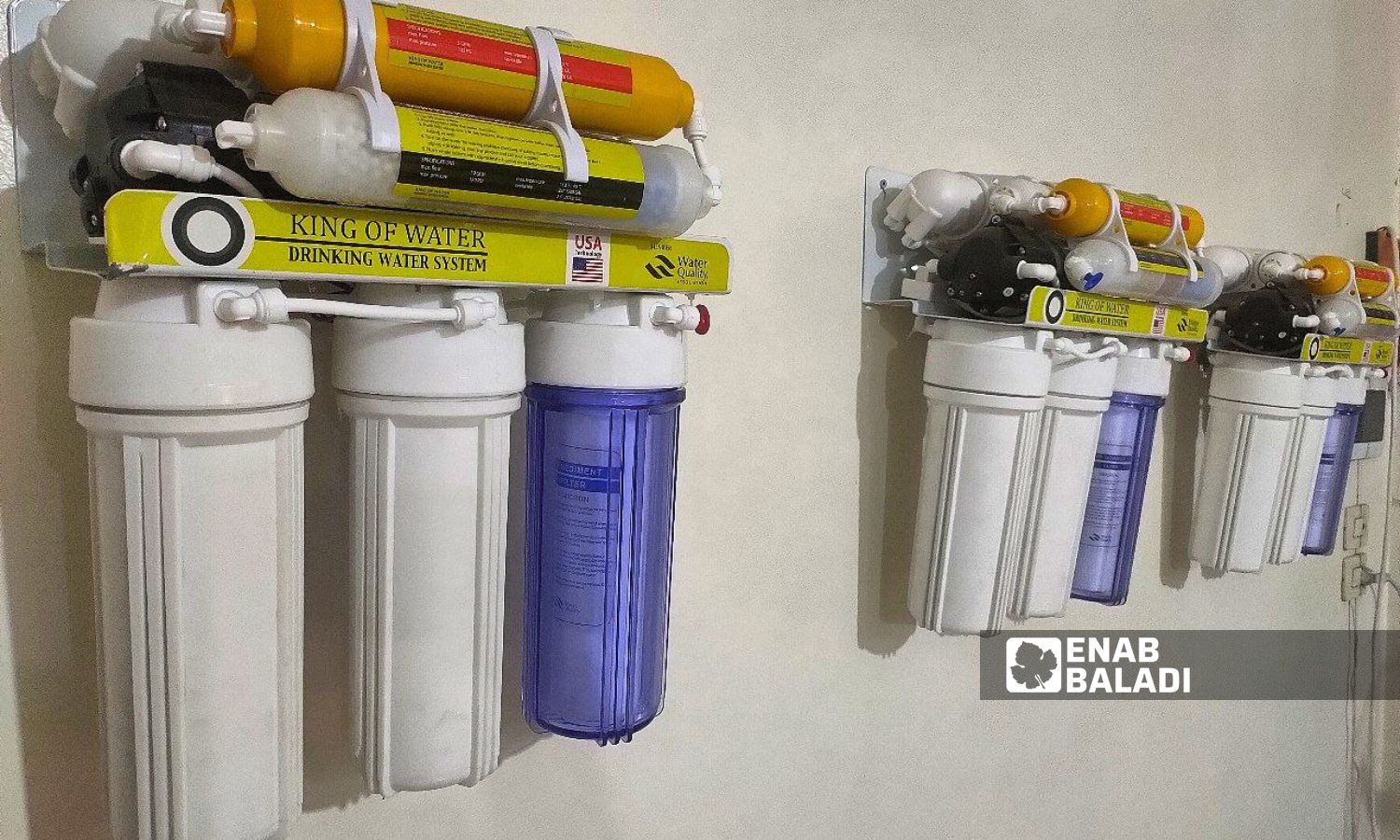



Qamishli – Majd al-Salem
With the ongoing water scarcity issues in al-Hasakah and some neighborhoods in Qamishli, and residents relying on unknown water sources, some have turned to buying and installing household water purification filters.
Water purification filters are not new to al-Hasakah, but the demand for them is increasing with persistent water pollution issues, to obtain clean water free of yellowish color or foul odor.
For years, even before the water scarcity problem, Rawa al-Ali (46 years old) from al-Corniche neighborhood in Qamishli used to boil the water designated for her family’s drinking or for preparing tea and coffee, then cool it and use it later.
She mentioned that the water reaching her home contains a high lime content and is unsuitable for making hot drinks; even tea appears cloudy when prepared with that water.
She added to Enab Baladi that she boils about four liters of water daily, storing it in a container to cool before using it for drinking and tea.
Nevertheless, thick lime deposits can visibly accumulate on the walls of the boiling container, according to al-Ali.
About six months ago, al-Ali’s family installed a purification filter to tackle the water pollution issue and the need to boil water before use, also reducing gas consumption. This has provided them with clean, pure water resembling bottled mineral water, as she noted.
With the onset of summer, some neighborhoods in Qamishli suffer from water shortages and repeated interruptions in drinking water supply, sometimes lasting several weeks.
Hussam al-Hussein (41 years old), a resident of the western neighborhood, frequently buys water from tankers at an amount occasionally reaching 50,000 Syrian pounds for one tank (one thousand liters).
He told Enab Baladi that he doesn’t know where this water comes from, as its quality and cleanliness vary from one tanker to another. Therefore, he had to install a water filter on the main house tank.
He added that most residents in the neighborhood installed water filters, despite their relatively high prices, considering a filter a common and necessary item in any household concerned about their family’s health.
According to what Enab Baladi observed, what drives residents to use filters the most is the issue of water shortages and reliance on unknown water sources outside the main network.
Additionally, the spread of personal wells in homes and private farms prompted people to filter that water, especially after repeated complaints and talk about the spread of kidney diseases and stone formation, with doctors recommending mineral water.
Various types of water filters are available in the local market, with prices determined in US dollars, where each dollar equals 15,000 Syrian pounds.
Ahmed al-Nasser (35 years old), who works at a company selling water purification systems and filters in Qamishli, said they sell dozens of household water filters monthly, which have seen increasing popularity this year.
He told Enab Baladi that the company offers monthly deals and sells in installments to help those interested in owning them, adding that the filters are sold in dollars at prices ranging between 75 and 110 dollars per filter, depending on the number of purification stages and the country of origin.
He explained that there are filters with five, seven, and eight stages, which can be customized according to the customer’s request. These filters might be Taiwanese, Chinese, or American, imported from Turkey through northern Iraq and entering via the Semalka crossing.
The filters require regular maintenance every six to eight months to maintain good quality water. The filters are replaced during each maintenance operation, costing the customer about 20 dollars, according to al-Nasser.
Chemical and laboratory specialist Abdullah Ramadan (47 years old) from Qamishli told Enab Baladi that residents have the right to be “somewhat” concerned about their health due to the deteriorating main water network in many neighborhoods.
He mentioned that the presence of impurities sometimes changes the water’s properties like taste, smell, and color. The water shortage issue has worsened the problem, pointing out that residents buy water from tankers relying on possibly non-compliant wells of unknown source for profit.
He added that the main network’s water is drinkable, and when analyzing the water, the focus is on its color, taste, and smell, as well as salinity, acidity, lime hardness, magnesium hardness, calcium levels, and chlorides.
The laboratory specialist explained that the acceptable lime level is up to 500 mg/liter, and the household filter’s role is to keep this level at lower limits, less than 300 mg/liter as in most of Qamishli’s water. It is better to use filters if available, making the hardness level 100 instead of 300.
Qamishli city suffers from water shortages during the current summer season, relying on three main sources for supply: the Hilaliya station west of Qamishli, the al-Ouija station south of the city, and the northern al-Hizam station. Additionally, some neighborhoods receive water from the Safan station in al-Malikiyah, known for its superior quality.
if you think the article contain wrong information or you have additional details Send Correction